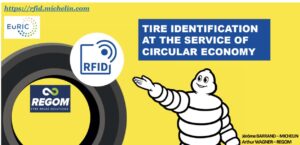Unlocking the Power of RFID for Tire Recycling
Every tire tells a story — a story of innovation, sustainability, and endless possibilities
Two French companies, Michelin and Regom, who believe in the power of technology to transform the tire industry, have joined forces to share their vision that, through Radio Frequency Identification (RFID) tires gain a voice.
RFID tags embedded in tires unlock access to essential data enhancing traceability, productivity, and quality, Michelin said.
With RFID, tires can share their journey, from the moment they’re produced through the whole value chain until their recycling process.
“This technology isn’t just about identification — it’s about unlocking a circular future for tires,” Regom said.
 Through the R&D collaboration Michelin and Regom encourage RFID integration to recycling end-of-life tires (ELTs) while encouraging circular economy.
Through the R&D collaboration Michelin and Regom encourage RFID integration to recycling end-of-life tires (ELTs) while encouraging circular economy.
With RFID, tires become easier to recycle, opening more sustainable tire applications with less tires going to waste, the companies said.
“This specific technology allows tires to be identified and gives access to information throughout their lifecycle.
Through this digitization the sorting of ELTs is optimized and opens the way to new material recycling industries to create second generation materials for reuse in tires, Michelin said.
Regom, located in the Burgandy region of France, develops, manufactures and maintains semi-automated used tire sorting machines designed to answer the identification and separation needs of tire recyclers including, material recovery, recycling, reuse, granulation or retreading. Its MTP-TRI machine can be implemented on any type of recycling line, the company said.
“Working with Michelin, we see how RFID technology makes tire sorting more efficient, faster, and simpler.”
This initiative builds on the success of the European Union’s CIRPASS-2 project, leveraging the expertise of Michelin and its partners to test RFID technology for the implementation of a digital product passport (DPP) for tires, creating a new standard for tire traceability and sustainability. The DPP enables data design and promotes more sustainable tires. It provides easy access to tire information to better retread and recycle them and helps identify value channels to recover material from end-of-life tires.
“This milestone is a major step forward for the circular economy, paving the way for sustainable and innovative tire recycling practices,” Michelin said.
© Scrap Tire News, January 2025






